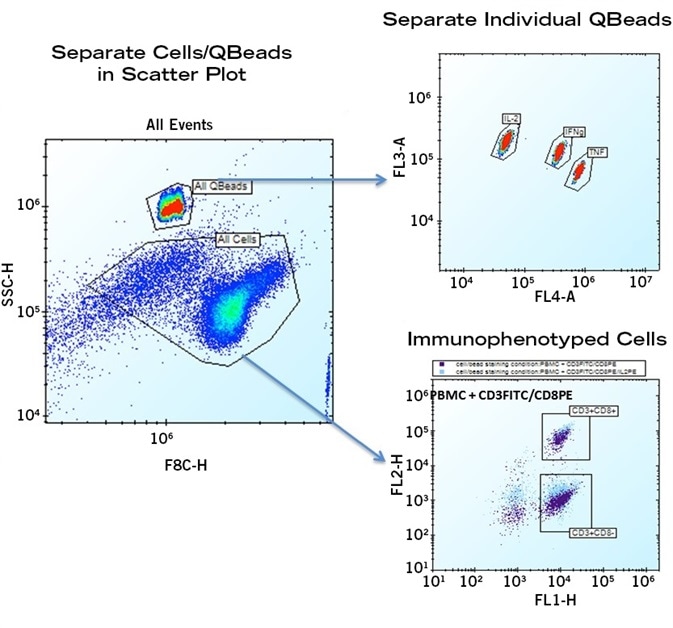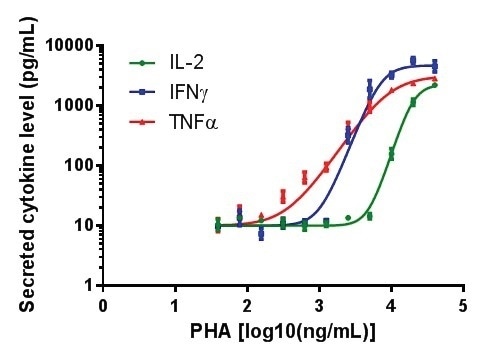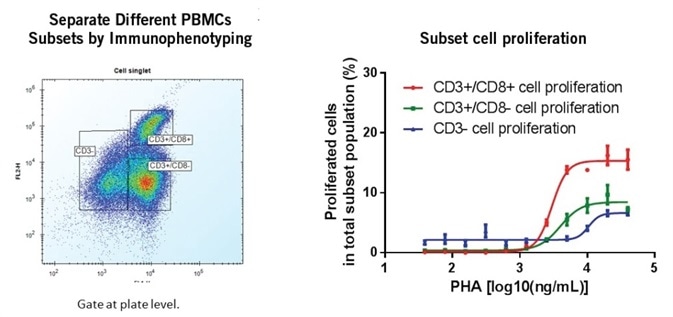Introduction
The biology of T-lymphocyte cells (T-cells) is highly complex and vital to our health and well-being. T-cells come in a number of types, which are defined by specific surface markers such as CD4+ or how they act in response to an immunological stimulus. For example, cytotoxic T cells (CTLs) kill tumor cells and virally infected cells, whereas regulatory T-cells (T-reg) modulate the activity of CTLs and suppress auto-immune responses.
T-helper cells (Th) can be further specified into subtypes like Th1 and Th17 that secrete different combinations of cytokines once activated by antigen presenting cells. By monitoring changes in cytokine secretion and proliferation this activation can be measured. To properly understand such a complex biology requires a platform capable of multiplexing cell and bead-based readouts using suspension cells.
The Sartorius iQue3 platform is perfectly suited to high content multiparametric screening assays such as the concurrent measurement of T-cell activation through proliferation, cytokine secretion and differentiation.
- QBeads are compatible with IPT antibodies and with MultiCyt proliferation dye.
- Measure secreted proteins (cytokines) and proliferation of immunophenotyped (IPT) PBMCs.
- The ForeCyt® software expertly manages data from complex experiments.
 Figure 1. Cytokine-capturing QBeads are clearly separated from PBMCs by their forward and side scatter (left plot). Individual QBeads populations are separated by dyes internal to the beads (upper right) while the cell populations are separated by anti-CD3 and anti-CD8 immunophenotyping antibodies conjugated with FITC and PE, respectively (lower right).
Figure 1. Cytokine-capturing QBeads are clearly separated from PBMCs by their forward and side scatter (left plot). Individual QBeads populations are separated by dyes internal to the beads (upper right) while the cell populations are separated by anti-CD3 and anti-CD8 immunophenotyping antibodies conjugated with FITC and PE, respectively (lower right).
Results
By treating PBMCs with PHA, activation is induced which results in proliferation, secretion of pro-inflammatory cytokines and changes in T-cell populations. The Sartorius iQue3 can measure each of these responses in the same well and at the same time. In this example, degree of proliferation of three immunophenotypes, as well as three cytokines was analyzed, placing the results in a highly correlated dataset.

Figure 2. Detection of cytokines by QBeads in the same well in which cells were immunophenotyped. Secreted proteins were detected 2 days after PHA treatment. Data is average +/- S.D. of 3 wells. Secreted profiles differ by dose and by time.

Figure 3. Activation of PBMCs over 2 days resulted in proliferation of T-cells. A) T-cells expressing CD3/FITC and CD8/PE (or neither) were gated in the ForeCyt® software. B) The proliferation of the 3 T-cell populations in response to various PHA doses were found to differ. Data is average +/- S.D. of 3 wells.
Summary
- The Sartorius iQue3 measures multiple parameters from samples containing both beads and cells. In this example, three distinct assays – proliferation, cytokine secretion, and IPT were run together and analyzed in a single read. This does not require washing or dividing the assay into multiple reads. It takes just one well, one read, and 6 end points for a highly correlated dataset.
- The Sartorius iQue3 enables large screening of complex biology with its high throughput. Complexity of the assay is not a factor in how fast the Sartorius iQue3 screens. One 384-well plate containing this complex assay was read in 18 minutes.
- ForeCyt® software enables rapid management, analysis and visualization of data from complex biology screens. This is performed in real time and allows templating of both gating, analysis and reporting.
 Sartorius
Sartorius
Sartorius is a leading international pharmaceutical and laboratory equipment supplier. With our innovative products and services, we are helping our customers across the entire globe to implement their complex and quality-critical biomanufacturing and laboratory processes reliably and economically.
The Group companies are united under the roof of Sartorius AG, which is listed on the Frankfurt Stock Exchange and holds the majority stake in Sartorius Stedim Biotech S.A. Quoted on the Paris Stock Exchange, this subgroup is comprised mainly of the Bioprocess Solutions Division.
Innovative Technologies Enable Medical Progress
A growing number of medications are biopharmaceuticals. These are produced using living cells in complex, lengthy and expensive procedures. The Bioprocess Solutions Division provides the essential products and technologies to accomplish this.
In fact, Sartorius has been pioneering and setting the standards for single-use products that are currently used throughout all biopharmaceutical manufacturing processes.
Making Lab Life Easier
Lab work is complex and demanding: Despite repetitive analytical routines, lab staff must perform each step in a highly concentrated and careful way for accurate results.
The Lab Products and Services Division helps lab personnel excel because its products, such as laboratory balances, pipettes and lab consumables, minimize human error, simplify workflows and reduce physical workloads
Sponsored Content Policy: News-Medical.net publishes articles and related content that may be derived from sources where we have existing commercial relationships, provided such content adds value to the core editorial ethos of News-Medical.Net which is to educate and inform site visitors interested in medical research, science, medical devices and treatments.